Today we travel to a fully digital world, a world where paper is a thing of the past.
On this show we’ve tackled a huge range of futures — we’ve talked about things that are extremely likely, like, antibiotic resistance, and we’ve also talked about things that are simply never going to happen. Like space pirates dragging a second moon to earth for some reason.
And when I started working on this episode, I assumed that this future was more on the likely end of the spectrum. Maybe not in a few years, but eventually, we’ll probably stop using paper, right? Well, pretty much everybody I talked to said I was wrong.
The first person we talk to in this episode is Michael Makin, the President and CEO of Printing Industries of America, an organization that represents the printers all over the United States. And Printing Industries of America isn’t the only organization out there trying to keep printing alive. In 2014, a group called Two Sides launched a campaign arguing that companies who advertised paperless billing as “green” were violating guidelines set by the Federal Trade Commission. And they actually got over 20 companies to stop advertising their paperless billing options as “environmentally friendly.” And this is one of the big arguments that the paper industry makes against going without paper: that it’s actually not nearly as environmentally friendly as people claim.
Now, it’s hard to make blanket statements about whether paper or digital is better for the environment. Both have their upsides and downsides, but it’s definitely true that many people don’t realize the environmental cost of browsing things online using their devices. According to the Centre for Sustainable Communications at the KTH Royal Institute of Technology, “the environmental impact of a web based newspaper is, in general, in the same range as a printed newspaper’s environmental impact.”
But Makin also says that he is totally convinced that paperlessness is just never going to happen. “I mean let’s be real, we are NEVER going to live in a paperless society,” he says.
Now, you’re probably thinking to yourself, “well duh Rose, of course the guy who represents the paper industry is going to say that paper will live forever.” Yes, yes, I know, but he’s actually not the only person who told me that they didn’t think paperlessness was coming any time soon.
Richard Harper told me the same thing. Harper is a researcher at Microsoft and the co-author of a book called The Myth of the Paperless Office. In the book Richard and his coauthor Abigail Sellen trace the phrase “paperless office” back to the 1970’s when Xerox founded a research group called PARC. And PARC was working on networked systems, ways for offices to talk to each other over all kinds of digital networks. But to push networks forward, they felt like they had to push something else out. So they villified paper as “the devil” and tried to propose the idea of a utopian future without paper.
But what Richard and Abigail found in their research was that paper wasn’t a devil, and it wasn’t really going anywhere. And they also found that most people don’t really want paper to go away. In fact, there’s no evidence that people are using less paper today than they were in the 1970’s.
If we do wind up going more and more digital, one thing we’ll have to worry about is how and where to store all those files. I can barely keep the files on my own computer in some kind of logical order, but when we’re all working digitally how do we preserve and archive anything? To find out I called up Lynda Schmitz Furig, who’s the electronic records archivist for The Smithsonian. Her job is to preserve everything digital that the Smithsonian creates. She tells us how they catalogue and store everything the Smithsonian creates.
But Lynda, like everybody else I talked to, doesn’t think we’ll have to worry about an entirely digital world just yet. And Naomi Baron, she’s a Professor of Linguistics at American University and the author of Words onscreen. The fate of reading in a digital world, agrees. We close out the episode talking to her about how digital screens change the way we read and remember things.
There are a bunch of things we didn’t get into in this episode, like the fact that paper is used for a lot more than just books and magazines and things to read. It’s in the grocery store, used as labels, it makes up our toilet paper and posters and the boxes in which we ship things. It’s used for money and for cooking and for research, and all sorts of other stuff.
If you have thoughts on our future with or without paper, or want to suggest a future topic for the show, you can send those by email to info@flashforwadpod.com or by voicemail or voice memo at (347) 927-1425. You can also find us on all kinds of social media like Facebook, and Twitter and now Reddit!
Flash Forward is produced by me, Rose Eveleth, and is part of the Boing Boing podcast family. The intro music is by Asura and the outtro music is by Broke for Free. Special thanks this week to Casey Broughton, Stephen Granade and Matt Weller. The episode art is by Matt Lubchansky.
And if you want to support the show, there are a few ways you can do that too! We have a Patreon page, where you can donate to the show. But if that’s not in the cards for you, you can head to iTunes and leave us a nice review or just tell your friends about us. Those things really do help.
That’s all for this future, come back next week and we’ll travel to a new one.
▹▹▹▹▹▹▹▹▹▹▹▹▹▹▹▹▹▹▹▹▹▹▹▹▹▹▹▹▹▹▹▹▹▹▹▹▹▹▹▹▹▹▹▹▹▹▹▹▹▹▹▹▹▹▹▹▹▹▹▹▹▹▹▹▹▹
TRANSCRIPT
Hello and welcome to Flash Forward! I’m Rose and I’m your host. Flash Forward is a pocast about the future. Every week, we take on a different possible, or not so possible future scenario. Every episode we start with a little trip to the future, and then we zip back to today to talk with experts about how that future might really go down.
Got it? Great.
This week let’s start in the year 2075
Narrator: There was once a time, when the Earth was covered in trees. They were among the most magnificent of all living things on the planet, producing much of the oxygen we relied on to breathe. We loved our trees. Documentary footage from the time speaks of them glowingly.
But perhaps, as often happens with humans, we loved them too much. For we not only loved them for their air and their beauty. We also loved them for their insides too. We used trees as a material for many things: furniture, buildings, boats. We ground wood into pulp, and pressed them into thin sheets.
Those sheets were then used for everything from disposable toilet paper to great books.
We called this substance paper, and for thousands of years it was crucial to the way that humans lived.
Voice: I remember my grandmother, she had all these paper books. The old kind, with the individual pages and the hard leathery covers. And they smelled really weird but we used to take them off the shelves and flip through the pages. She used to like to read to us from the books, and we humored her mostly.
Voice2: Whenever someone used to die we would know, if they were a certain age, that we were going to have to deal with paper when we cleaned out their stuff. Younger folks never paper, but the older ones, this was a long time ago, but the older ones would always keep it. You’d get magazines and books and letters and all that. All on paper. We had to wear gloves to handle it, since it could cut you if you weren’t careful.
Narrator: Slowly, as humans became more voracious and more numerous, the demand for paper grew. During the Great Malware Blackout, when coordinated attacks brought down the world’s digital devices for nearly a year, we turned even more to this trusty, woody substance. Paper manufacturers struggled to keep up with demand.
Voice3: We used to get tickets for how much we could use. One ticket per ten ply of whatever it was. My mom really liked this super thick toilet paper and she would use the whole family’s tickets just to get a single roll. My sister and I would have to borrow tickets from our uncle, so we could do our school work.
Narrator: The run on paper took its toll. Forests became slim and then rare. Today, as humans expand to nearly all reaches of the globe, it’s hard to imagine using our few remaining trees for writing or reading. But history is full of quirks.
[Music Fades Out]
Rose: Okay so in this future we no longer use paper, everything is digital. Now, on the show we’ve tackled a huge range of futures — we’ve talked about things that are extremely likely, like, antibiotic resistance, and we’ve also talked about things that are … never going to happen. Like space pirates dragging a second moon to earth for some reason.
And when I started working on this episode, I assumed that this future was more on the likely end of the spectrum. Maybe not in a few years, but eventually, we’ll probably stop using paper, right? Well, pretty much everybody I talked to said… no.
Michael Makin: So I think it’s fanciful, the likelihood of a paperless society is about as likely at the moon pirates scenario that your show featured previously.
Rose: That’s Michael Makin, he’s the President and CEO of Printing Industries of America.
Michael: Printing industries of America is the national voice of the printing industry in the United States, it’s 150 billion dollar a year industry that has 28,000 commercial printing facilities, all across the United States. it’s the quintessential small business there’s a printer in virtually every single city and town all across the United States.
Rose: So it’s Michael’s job to represent and protect people who work in the printing industry. And Printing Industries of America isn’t the only organization out there trying to keep printing alive. In 2014, a group called Two Sides launched a campaign arguing that companies who advertised paperless billing as “green” were violating guidelines set by the Federal Trade Commission. And they actually got over 20 companies to stop advertising their paperless billing options as “environmentally friendly.” And this is one of the big arguments that the paper industry makes against abandoning paper.
Michael: I think you’d have a cataclysmic environmental disaster. Because because if you relied solely on technology, and on digital technology, and which does not have the same environmental recyclability or ability to be absorbed in our atmosphere, as far as CO2 emissions are concerned, as far as landfill is concerned. You’d have an absolutely unmitigated catastrophe.
Rose: Now, it’s hard to make blanket statements about whether paper or digital is better for the environment. Both have their upsides and downsides, and for both there are better and worse ways to use and recycle the materials. And it’s true that many people don’t realize how environmentally unfriendly their digital devices are, from mining rare metals to the e-waste that these machines create once they become obsolete.
But according to Michael, moving entirely away from paper isn’t just a bad move environmentally. It’s a bad move for all sorts of reasons. And he really thinks it’s just never going to happen.
Michael: I think it’s really a cliche, I mean the calls for a paperless society have been for decades. You may remember the Wang computer company, the Wang computer company was the first to prophesize that in the year 2000 we would be living in the paperless society. Of course the only thing we were living in in 2000 was a Wangless society, because that computer company went out of business. And so it rather infuriates those of us who work in the space because we are talking about 700, 800 thousand hardworking men and women and their families being supported by this community and to have irresponsible statements like that is just not “cool” as it were. I mean let’s be real, we are never going to live in a paperless society.
Rose: Now, I think I probably know what you are thinking. Obviously the president and CEO of an organization that represents people the printing industry is going to say this. Why would he say “oh yes I think that we should move to a paperless society, that seems like a great idea?” He would not. But Makin actually isn’t the only expert I talked to who said that they didn’t think paperlessness is in our future.
Richard Harper: No there’s no evidence we are in fact paper consumption in offices continues to go up, and I can say that authoritatively because my last job before I got on this Skype call with you was to do a report for the paper industry on that. It seems to be correlated with Gross National Produce and not the introduction of shared networks or machine learning tools, it just seems to be crude.
Rose: That’s Richard Harper, who’s a researcher at Microsoft and the co-author of a book called The Myth of the Paperless Office. Now Richard has spent a lot of time thinking about paper and whether or not offices will ever actually go paperless. In the book Richard and his coauthor Abigail Sellen trace the phrase “paperless office” back to the 1970’s when Xerox founded a research group called PARC. And PARC was working on networked systems, ways for offices to talk to each other over all kinds of digital networks. But to push networks forward, they felt like they had to push something else out.
Richard: One of the things I think your show is partly about is myths, and sometimes myths are made as a way to justify something else. So when Xerox was building network systems, they had to come up with a reason to come up for building these networked systems, and one of the reasons they came up with was that there’s a devil in the workplace and the devil is paper. And paper is the devil because one: paper is conspicuous consumption. Two: it’s physically burdensome. Three: it symbolizes a way of doing business and thinking which must be old. So therefor if you were to achieve success and reimagine the office and make it all digital then clearly when you do that the old devil will go.
Rose: But what Richard and Abigail found in their research was that paper wasn’t a devil, and it wasn’t really going anywhere. And they also found that most people don’t really want paper to go away. Richard gave one example, of brochures and magazines. When they looked at how people shop online, and how people interact with printed catalogues, what they found is that people actually do use catalogues still, and they like them.
Richard: One of the things I’ve discovered is that when brochures arrive they’re not handled straight away, they’re flung in places, and the places they’re flung to are like on the couch, or beside the couch, are places were at some future time the person bumps into them, when they are ready to be bumped into, when they make themselves available to be indolent, and when they’re searching for something to do. So there’s a sense in which you can put paper in those little nooks and crannies that you go to naturally in the ebb and flow of your domestic life, and when you get there you’re in a mood. You say “Oh look! Let’s have a look through that! Let’s do some online shopping.” And that’s a property of paper, it finds itself washed up in places where people let themselves be washed up because they want to be indolent and charmed and confronted with content and images.
Rose: And Richard says that this is contrasted by how people shop online.
Richard: When you’re online shopping you feel encouraged to be in a motor race, to get to the end quickly. You don’t go shopping to do it quickly, you go shopping for an experience. So how does a search engine optimized for speed deliver the right experience,it should be designed to let you linger, to let you do the window shopping, to let you dither, to let you gaze, to let you wonder pointlessly at things you know you’re never going to buy.
Rose: Now I have to say that I haven’t looked at a catalogue to buy something in … a very long time. Like I can’t actually remember the last time I looked at a catalogue. I do most of my shopping online, and I actually feel like I do a lot of browsing and perusing of things I won’t buy online. So, maybe this is changing. If I’m any indication. Or maybe I’m just totally missing out of the wonder of catalogues? I don’t know.
Coming up we’re going to talk about what we know about how reading digitally and reading on paper might be different, as well as how to actually store all this digital stuff we’ll be making. But first, a quick word from our sponsors.
[[AD]]
Rose: So we’ve just been talking about a future without paper, and one thing that I always wonder about going digital, is just how we’re going to store and keep track of everything. I can barely keep the files on my own computer in some kind of logical order, but when we’re all working digitally how do we preserve and archive anything?
Of course there are already archivists and historians working on this exact question.
Lynda Schmitz Furig: Obviously it depends, there are some people who really want to touch that paper that has that person’s signature on it. But on the other hand, if a digital copy of it where you’re able to sit down at your computer and actually zoom in and look even more closely at that document then you could just going into a reading room, that can be eye opening as well.
Rose: That’s Lynda Schmitz Furig, who’s the electronic records archivist for The Smithsonian. Her job is to preserve everything digital that the Smithsonian creates.
Lynda: I deal with all the born digital material that’s being generated with across the institution, so we’re talking about digital images, word processing, digital audio, video, all the Smithsonian websites and social media accounts, we try to capture most of those as well.
Rose: One of the nice things about paper is that it generally stays readable for a long time. But when you’re talking about digital files, the format things are in can pretty quickly become obsolete and impossible to read. You probably couldn’t access the information a floppy disk if I gave you one, or open a VisiCalc file if I sent you one. And this is something that Lynda has to deal with all the time.
Lynda: We have equipment where we’re able to still read these old pieces of media thankfully. So we’re keeping older operating systems around as well as devices to access some of this.
Rose: So Lynda spends a lot of time trying to make sure that files are in a format that people will be able to read for a long time, but there’s also no guarantee that PDF or WAV files will stand the test of time. She might have to convert them all in 10 years to some new format we haven’t even invented yet. With paper, that’s just not an issue.
And then there’s the question of storage.
Lynda: So we have about 7TB of data currently, and that’s going to continue to grow
Rose: And that’s just for the stuff that the Smithsonian Institution generates. Every year the US Library of Congress team adds about five terabytes of data to their collection. Ancestry.com says it has 600 TB of genealogical data. And Facebook says that is scans about 105 terabytes of data each half hour. We’re generating more data right now than ever before, and none of it is stored or archived in a regular way. The idea of having to manage all of that, let’s just say Lynda doesn’t think we’re quite ready.
Lynda: Oh boy, I, it’s kind of scary to think about that.
Rose: But she, like everybody else I talked to, doesn’t think we’ll have to worry about an entirely digital world just yet.
Lynda: You know there’s people who still enjoy a good physical book, like myself, I can’t imagine that’s really going away. And just think about the world of art, do you really want to view everything digitally? As opposed to going to a museum and actually seeing something that somebody painted or sketched?
Rose: And the data actually shows that Lynda is right, people do enjoy a good book. A good physical book.
Naomi Baron: I can’t tell you how many people said what they like most about print is the smell of the book. This is 20 year olds? Come on! It’s true. How much they talked about the feel of the book, of liking to turn pages or put their fingers between the clump of pages they finished and the ones they still have to read.
Rose: That’s Naomi Baron, she’s a Professor of Linguistics at American University and the author of Words onscreen. The fate of reading in a digital world. And she’s done a whole lot of research on how people read and engage with things on screens versus things on paper. And her research shows that people really do like paper.
Naomi: In the research that I’ve done on more than 400 university students around the world, I’ve said “what is the medium for reading on which you concentrate best.” 92 percent said print. Hm, this is them speaking not me, this is digital millennils ages 18-26, I asked them, “if the cost were the same” because cost is often what driving the switch to digital, not choice but cost, I asked them “If cost were the same, would you prefer for your school work to read in print or digitally,” I asked same question about reading for pleasure. 87 percent said if cost were the same I would rather read in print for school work. THey said this! They could have said anything they wanted. 81 percent said of cost were the same, they’d rather do their pleasure reading in print. These are the digital mills, these are the ones I can’t get to stop texting in my classes. They’re on their devices, but if you ask them they’ll give you a very different story than the one you assume that they’ll give.
Rose: But the future doesn’t always take into account what we like. So what if we did wind up in a world without paper. Maybe some beetle decimates all the paper trees, or some dictator says: no more paper! It turns out there’s a lot we don’t really know about the differences between reading on screens and reading on paper. Some research suggests that retention rates are lower when we read digitally, but other work has shown that it’s about the same.
We do know a few things though: Baron’s research shows pretty clearly that with digital files you don’t revisit things as much as you do with a physical copy of a thing.
Naomi: So in my research I’ve asked students, “how often do you go back and read things if they’re digital or if they’re in print.” And I asked this about reading for pleasure, and reading for school work. They reread much less if it were digital, because it’s out of sight out of mind, there’s an attitude that says, “zip it’s gone” because that’s what the medium does for us. I mean it’s Snapchat on steroids.
Rose: And some authors have argued that when everybody is reading on their devices, books will have to be shorter, with simpler storylines and less complex narratives.
We also know that in general we are reading and writing more words than ever, but in different formats. Less books and letters, more emails and texts.
Richard: So if you were a Victorian, to put it in English terms, or if you were a 19th century Robber Baron as you were in New York. If you were to jump from your organization then, to your organization today you’d be shocked at how much communication is done. And you would think, how would my organizational notes become such contagion that each morning I spend hour sanda continuously fragmented day dealing with those things.
Rose: So in the future without paper, this trend may continue. Shorter and shorter missives, shorter and shorter books, more serialized narratives broken into chunks,
Naomi: If it’s good enough for Charles Dickens, good enough for us.
Rose: And more images, more emoji, more GIFs
Naomi: So yes I think an awful lot of what we’re doing online is having some influence on the way we write. But a lot of it is, number one shorten and number two do something that’s attention getting, and if you want to get my attention don’t give me two very long paragraphs.
Rose: Now, Michael, the printing industries guy, he has a really doomsday version of this future:
Michael: You may have a paperless society but they may be a bunch of idiots that don’t understand how to communicate and have no formal knowledge or cannot retain anything, they’d be like pouring water in a sieve. It would probably be a perfect example of looking at The Walking Dead, because you’d have all these dumb people walking around in a catastrophic state, in garbage. Because that’s what you’d have.
Rose: I don’t think that’s quite right, although I enjoy his enthusiasm. But one thing thing I did ask Naomi, is what she thinks we should do to prepare for this future. Let’s say we knew it was coming, we had two years before paper was gone or banned or whatever it is. How do we get ready? And she said that we need to figure out how to focus again.
Naomi: There are various kinds of software that are out that cut off the internet connection while we’re working on a digital device. And you block for the amount of time you set. Excuse me? You could have just not plugged into the internet! But we can’t make ourselves do this! Why do we need to do this? Because these are devices we’re used to interacting with, and we’re always used to having other kinds of activity, or distraction available. Until we figure out that one we’re going to be in deep trouble, if we actually want people to seriously read and think and contemplate..
Rose: In this paperless future, when we sit down to read something, we need to figure out how to just … read that thing. Not check email or FB every few minutes, or respond to each buzzing notification we get. And that’s going to be really hard, I think. Because these devices that we have, that we’re using to read, they’re designed to be connected, and they’re full of apps that want our attention all the time.
Naomi: Before I got a smartphone I didn’t have any trouble, but now I that I have a smart phone it’s harder for me to ignore messages. I have to turn the whole thing off and then it takes forever to turn back on again, so I put it on vibrate and then I hear the vibration. And we’re human beings and until we figure out how to be like Marie Curie, who could probably have a team of 500 horses march in front of her and she wouldn’t hear it, we’re going to have to solve this problem. And that’s what I see as being our biggest challenge.
Rose: There are a bunch of things we didn’t get into in this episode, like the fact that paper is used for a lot more than just books and magazines and things to read. It’s in the grocery store, used as labels, it makes up our toilet paper and posters and the boxes in which we ship things. It’s used for money and for cooking and for research, and all sorts of other stuff. And if you go to flashforwardpod.com I’ll have a bunch of links to more on those areas of paper as well as links to things we mentioned in the show.
Flash Forward is part of the Boing Boing podcast family. It’s produced by me, Rose Eveleth. Special thanks this week to Casey Broughton, Stephen Granade and Matt Weller. The episode art is by Matt Lubchansky. The intro music is by Asura and the Outtro music is by Broke for Free.
If you have thoughts on our future with or without paper, or want to suggest a future topic for the show, you can send those by email to info@flashforwadpod.com or by voicemail or voice memo at (347) 927-1425. You can also find us on all kinds of social media like Facebook, and Twitter and now Reddit! Links to all of that stuff will be on our website.
And if you like the show, you can help me keep making it by donating! Head to Patreon.com/roseveleth for more on what you get as a donor, and to pitch in to keep the show happening. My microphone is dying and I need to buy a new one so now is an especially great time to give. If you can’t donate, that’s cool, leave us a nice review on iTunes! Or tell a friend about the show! That is helpful too!
That’s all for this future, come back next week and we’ll travel to a new one!

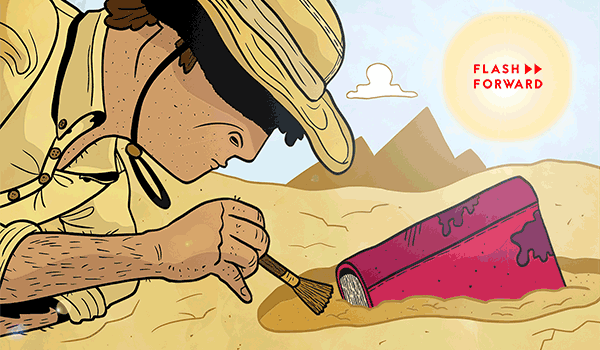
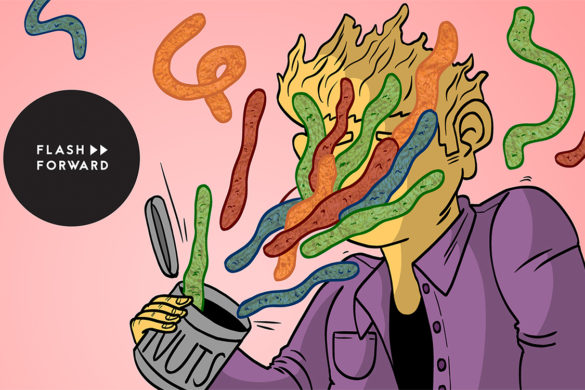
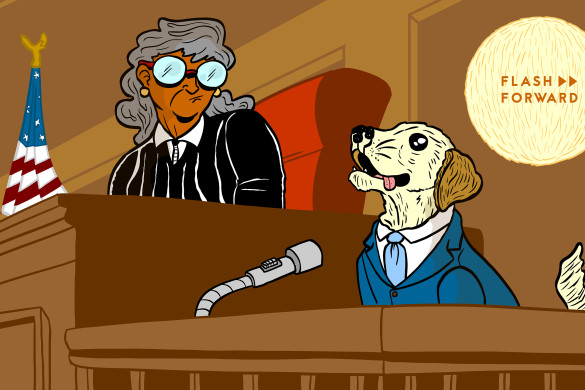
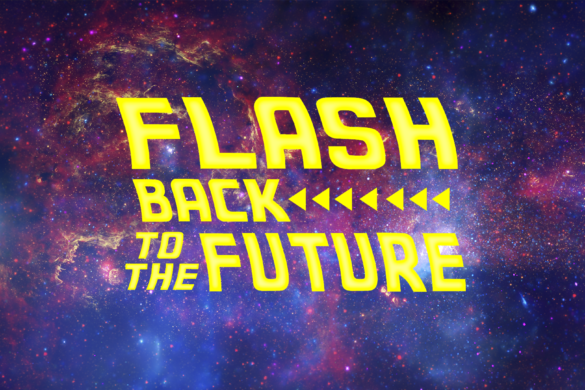
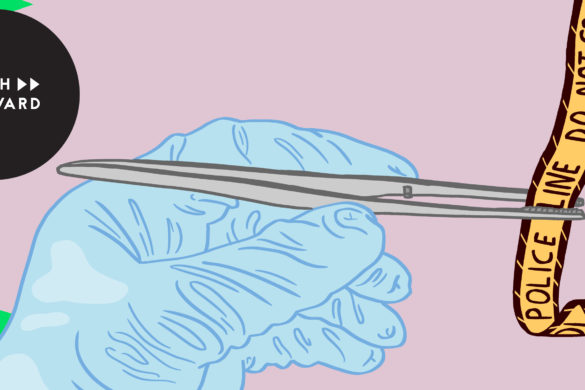
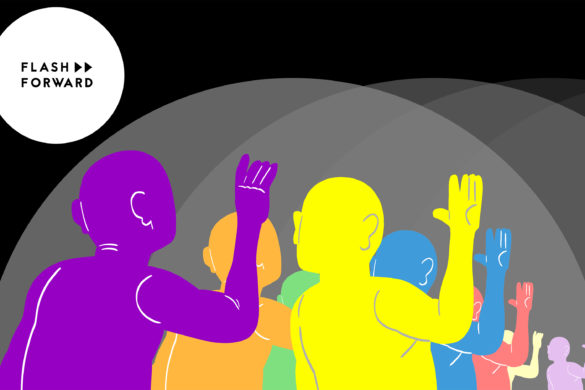
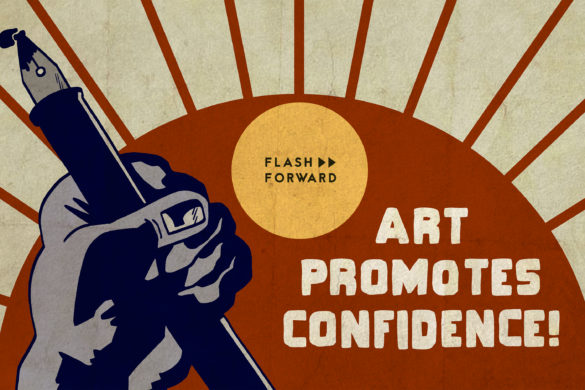
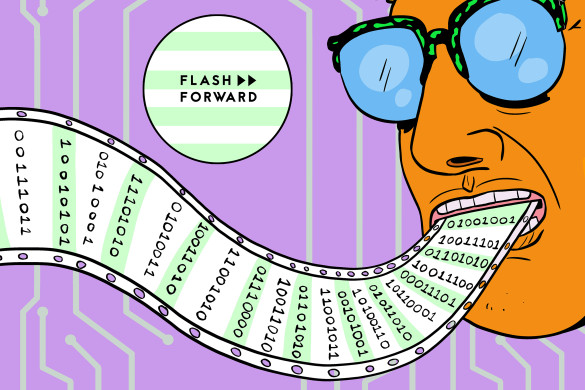
13 comments
I did some research for a sci-fi story I was writing a couple years back. Paper is the LEAST of our problems in a future without trees. The effects on climate are enormous, and the damage that would be done to animal and bird species worldwide are straight-up apocalyptic.
Then there’s the little fact that wood has been the single most heavily-used material for building construction and commercial goods in all of human history.
Might I suggest a future edition of Flash-Forward looking at a world without trees, or at the very least commercial-grade timber? That future is a lot more plausible than you might think.
[…] https://www.flashforwardpod.com/2016/03/29/episode-09-tree-free/ […]
Great episode! I disagree with your experts, though. The two main arguments for continued paper were “…if cost isn’t an issue, people prefer paper…” and “…people prefer to hold paper…” Well, if cost isn’t an issue, I’d drive a Nissan Z and live on a lavish estate. It is. I don’t. And the traditionalist argument only holds so much water. I mean, the experts of media have said for years that nobody would listen to audio over the internet if they had any other choice, and every year those same experts declare podcasts are over, and yet every year the number of podcasts grow and every company is scrambling to make one and traditional media is constantly complaining about a drop in audience.
Yes, paper will probably exist forever, and for some applications it will be irreplaceable. But there will come a point where paper and shipping that paper and warehousing paper is just too expensive for daily use, and digital is already there, already exponentially less expense in every way, and will be patiently standing by whenever we call on it.
[…] ▹▹ Full show notes […]
[…] ▹▹ Full show notes […]
[…] ▹▹ Full show notes […]
[…] ▹▹ Full show notes […]
[…] ▹▹ Full show notes […]
[…] ▹▹ Full uncover notes […]
30 years ago when I started working in ‘Data Processing’ (now called ‘Information Technology’) I had files and bookcases full of manuals. I received paper magazines from various industry sources. I assembled my own manuals out of paper handouts from training and things I collected from multiple sources. Transition – I collected things I found online. By the time I retired my cabinets and bookcases were empty. All technical manuals were online and searchable. All professional magazines were delivered electronically. There were many fewer copy machines available and only rarely did I feel the need to print something out. I am not sure what sorts of offices are still swimming in paper but they will be automated and the amount of paper will decrease as that happens. I do like to read physical books because I like to hold multiple places with my fingers and quickly flip back and forth. I also tend to record things I read in a ‘commonplace book’. If I am reading online the screen goes dark while I am doing this. The book remains a trusty book.
[…] Even the technologies we use continually evolve and become obsolete. In the podcast episode “Tree Free,” there is a woman whose job it is to turn information on obsolete technologies into something we […]
Gotta say that I disagreed with a lot in this one. The experts heavily tied learning and focus with book reading. Well, I know a lot of people in the blind community that would disagree with you there. And for me, I am a very auditory learner.
Pretty sure we would be fine without books, but I still enjoy them.
Nice episode, glad to have found you! As a maker of paper (on a relatively small, handmade scale) I think we’ll always have paper, especially rag and plant based paper like cotton, hemp, linen, and mulberry. But it would be wonderful if we focused less on using trees (which don’t make very good paper because of their lignin content) as our main source of pulp for office type papers. There are companies like Step Forward Paper that are focusing on agricultural waste as a pulp source, and fingers crossed that this is the future of the industry.